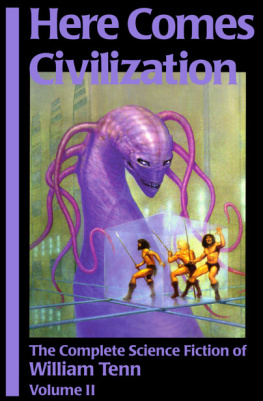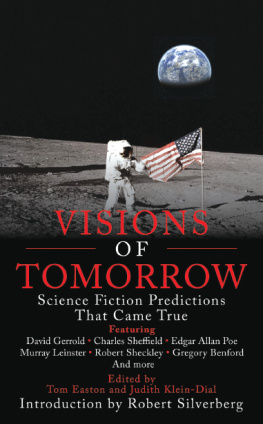HERE COMES CIVILIZATION:
THE COMPLETE SCIENCE FICTION OF WILLIAM TENN VOLUME II
William Tenn
INTRODUCTION
Robert Silverberg
The lone lamentable thing about this two-volume collection of William Tenn's science fiction (of which this is Volume Two, and if you don't already own Volume One, Immodest Proposals , you should run right out and buy it) is its subtitle: The Complete Science Fiction of William Tenn. In a properly ordered world, the complete science fiction of William Tenn would fill many more volumes than these mere piddling two. You could not get the complete science fiction of Robert A. Heinlein or Philip K. Dick or Isaac Asimov into just two volumes, be they the size of the Manhattan telephone directory. Even Ray Bradbury, who like William Tenn has primarily been a short-story writer, would need half a dozen or more omnibus-sized books. As for the complete science fiction of Robert Silverbergwell, you get the idea.
But here we have the complete William Tennthe gesammelte Werke of a man who has been writing the stuff for more than half a centuryand the whole megalith takes only these two volumes. This is truly lamentable, and I lament it herewith. There should be eight volumes this size. There should be eighteen. If you believe that the stories in these two books are brilliant, intricately inventive, and tremendously funny, which I assure you they are, then you ought to read the stories he didn't get around to writing.
They are, let me confidently assert, absolutely terrific. The least of them would burn a hole in your memory bank forever. When I think of all the magnificent unwritten William Tenn stories languishing out there in the limbo of nonexistence, I want to weep. The great trilogy set in the parallel universe where Horace Gold and John Campbell are the rival emperors of a decadent Byzantine Empirethe dozen mordant tales of the Solomonic decisions of the Chief Rabbi of Marsthe intricate reverse deconstruction of Heinlein's "By His Bootstraps"you'd love them. I guarantee it. But where are they? Nowhere, that's where. Philthat's what I call "William Tenn," Phil , because that happens to be his real name, Philip Klassnever got around to writing them. And though he's only in his ninth decade and still posing as an active writer, the same pose that he has hidden behind for the past fifty years, I don't think he ever will.
I'll tell you why, too.
It's this Scheherezade business. In her introduction to Volume One, Connie Willis lets us know that Charles Brown of Locus magazine once referred to Phil as "the Scheherezade of science fiction." I confess I have some issues with that tagit is very hard for me to envision Scheherezade as a diminutive male Jewish octogenarian with a grizzled beard, and I bet you that Sultan Shahryar would have had an even tougher time with itbut I do see Charles' point. Scheherezade had the gift of gab. She was one of the world's great storytellers, right up there with Homer and Dickens and the Ancient Mariner, a spellbinder whose tales everybody still knows and loves a thousand years later. When she spoke, you had no choice but to listen. Of course, Scheherezade was telling you about Sinbad the Sailor and Ali Baba and Aladdin, irresistible, imperishable stories. But she must also have been quite a talker, because she had to get the Sultan's attention first, so that he would let her tell the stories that would distract him from cutting off her head.
Phil KlassI remind you, that is the natal name of the man who wrote the Complete Science Fiction of William Tennis quite a talker too. And it is my belief that he let the other eight, or ten, or sixteen volumes of the Complete Science Fiction evaporate into the smoky air of ten million cocktail parties instead of writing the damn stuff down.
My image of Phil, a man whom I've known since 1956 or thereabouts, is that of a small man with constantly moving jaws. He was talking a mile a minute when I met him at some gathering of our colleagues in New York in the 1950s, he has talked at the same dizzyingly rapid rate all through the succeeding decades, and, though it's a few years since I've seen him, since we live on opposite coasts of North America these days, I'm quite certain that he is talking right now, back there in far-off Pennsylvania. Now, of course, this being the twenty-first century long fabled in song and story by the members of our little guild, his verbal velocity really ought to be measured metrically, and so we can consider that nowadays he talks at 1.6 kilometers a minute, but the effect is just the same, which is that of a man bubbling over with immensely interesting ideas, all of which he wants to share with you in a single outpouring of breath.
Among those ideas, I'm afraid, were some of his best stories. We professional writers are all taught, back in the days when we were would-be writers who read Writer's Digest and studied books on how to double-space manuscripts, that writers must never talk about work in progress, because there is a real risk of talking the work away. Phil knew all about that rule long before I had ever heard the name of John W. Campbell, Jr. He didn't care, or else he is just such a compulsive talker that he can't stop himself. I can remember his talking about a long story that he was writing called "Winthrop Was Stubborn" for something like a year, back in the vicinity of 1956 and the early months of 1957. I got to know the story very well in that time, to the point where I began to think I was writing it myself. I also came to believe that the story wasn't being written at all, merely talked, and great was my surprise when it actually appeared in the August, 1957 issue of Galaxy (I remember the date very well, because I had a story in the same issue) under editor Horace Gold's title of "Time Waits for Winthrop." You will find that storyPhil's, not minein the first volume of this set, under his original, and preferred, title of "Winthrop Was Stubborn."
"Winthrop Was Stubborn" is the exception that proves the rule. Phil almost talked that one away, but somehow he wrote it, anyway. It's a sly, splendidly mordant story, almost as good as the ones you can't read because Phil never bothered to write them. He did the same thing with the novel contained in this volume, Of Men and Monsters , talked and talked and talked about writing an actual novel, which he had never done before, and which none of us expected to live long enough to see, even after a piece of it appeared in Galaxy in 1963. By that time it had been at least a thousand and one nights in the making, perhaps more; yet it was five years more before the complete opus was offered to an incredulous world by Ballantine Books.
Of Men and Monsters is, unless I've lost count, the only novel Phil Klass has managed to finish. (His other long story, "A Lamp for Medusa," is just a novella.) He's talked the rest away at parties. Some went into thin air and were never heard of again. Others did get written, but not by Phil. You've heard of Stranger in a Strange Land by Robert A. Heinlein? Rendezvous with Rama by Arthur C. Clarke? Battlefield Earth by L. Ron Hubbard? The Great Gatsby by F. Scott Fitzgerald? All of these should have borne the William Tenn byline. But he talked about them and talked about them and talked about them at party after party ("my Long Island story," is what he called Gatsby and "my definitive space-opera novel," is how he described Battlefield Earth ) and the ideas for them sounded terrific. And finally, when they realized he was never actually going to write them, those other guys went ahead and did the job for him. It's a crying shame, one of the great scandals of twentieth-century literature.
Well, now and then he did, over the past five decades plus, actually sit down and write something, and I suppose we should be grateful for the small fraction of the Complete Works of William Tenn that NESFA Press was able to publish in these two slender volumes. Let us rejoice that we do, because, as I said somewhere or other once, he is a writer of witty, cynical, and often darkly comic science fictionI know I said it, because I'm quoted to that effect on the back cover of these booksand, moreover, he is a superb writer of witty, cynical, and often darkly comic science fiction. I will cherish these two books forever, and so should you. And we all should hope that Phil, as he continues to live long and prosper, will perhaps do a little writing once in a while, and give us a few down payments against the magnificent third volume of the Collected Works that he owes us all.
Next page










